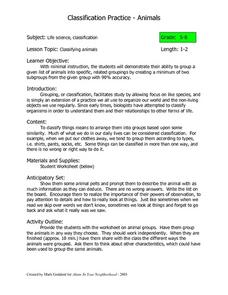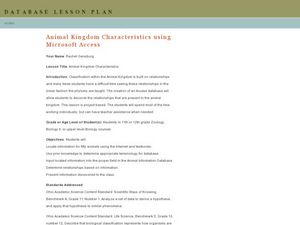Scholastic
Study Jams! The Kingdoms of Life
Zoe and RJ discuss the way scientists classify organisms into five kingdoms. Characteristics of each group are highlighted within their conversation and with text. First-time taxonomists can view the animation at home, take the...
Curated OER
Everything in Its Place: Science Classification
Students investigate the system of classification for living things through the sixteen lessons of this unit. The five kingdoms of monerans, protists, fungi, plants, and animals form the basis of several experiments as the similarities...
Curated OER
Life Science Animal Worksheet: Mammals
In this animal classification practice worksheet, students examine the 6 pictured animals and identify the animals that are mammals.
Mr. Jones's Science Class
Periodic Table Project
Don't be fooled by the title; this is not really a lesson on elements. It is a project on classification, using the periodic table as an example. For that reason, it could be used in any branch of science. As an example, a group may...
Curated OER
Classification Practice-Animals
Students use pictures of animals to make a classification system. In this classification lesson plan, students are given pictures of different animals. They create a classification system for the animals and identify what they have in...
Curated OER
What's Your Genus? Scientific Classification and the VT
Students learn about binomial nomenclature, the scientific system of classification. In this scientific classification lesson, students work cooperatively to complete a binomial scavenger hunt using the internet and a Visual Thesaurus....
Curated OER
Organizing Life
In this taxonomy worksheet, students learn about Linnaeus' system for classifying living things. Students complete 2 fill in the blank and 2 short answer questions based on what they read.
Casimir Middle School
Biological Classification Worksheet
Classify living things with a set of worksheets that has pupils sorting and indentifying living and non-living things. Learners use the worksheets as a basis for finding their answers.
K20 LEARN
It's Alive! Or, Is It?
Seems like a fairly simple question—until you begin asking your class! Get pupils acquainted with the characteristics of life through pairs classification, discussion, and scientific reading. The lesson plan, part of the K20 series, also...
Intel
Insects: The Good, The Bad, The Ugly
What would the world be like with no insects? Ponder this question using a research-based STEM unit that encourages scholars to investigate insects from both a beneficial and hazardous perspective. They learn about insect behaviors,...
Curated OER
Animal Kingdom Characteristics using Microsoft Access
Students create a computer database to discover relationships present in the Animal Kingdom. In this classification lesson, students enter data into a Microsoft Access database. They answer questions on a worksheet and create a visual...
Curated OER
The Life Cycle of the Mealworm
Fourth graders provide a habitat for live mealworms and observe their life cycle. In this animal life cycle and scientific inquiry lesson, 4th graders create a habitat for a live mealworm and observe and record related data as it grows....
Curated OER
The Game of Life
Students explore the game of life which refers to what happens to a species when most of the population is gone. In this endangered species lesson plan, students describe what it means for a marine animal to be endangered. Students...
Curated OER
Reading the River - Biological Classification
Youngsters create a list of grocery store items and then work together to categorize them as if they were setting up the shelves of the market. Then they are given a box of miscellaneous objects to practice categorizing. With these two...
Virginia Department of Education
Animal Phyla and Plant Divisions
Searched hours for an activity that allows individuals the ability to use multiple resources to learn about both plant and animal kingdoms? This discussion and activity provide pupils with the ability to visualize each organism...
Teacher Web
Archaebacteria and Eubacteria
Take young biologists back to the beginning of life on Earth with this presentation on bacteria. Examining the different classifications of bacteria, this presentation introduces young scientists to the concepts of autotrophs and...
Lerner Publishing
Meet the Dinosaurs
Take your class of youngsters on a prehistoric adventure with this four-lesson series on dinosaurs. Accompanying the Meet the Dinosaurs books by Don Lessem, these lessons engage children in writing their own dinosaur books,...
Super Teacher Worksheets
Mammal Scavenger Hunt Activity
Did you know that a polar bear's skin is actually black? Or that the lightest mammal weighs less than a paperclip? Young scientists learn these and other amazing facts about mammals as they explore the animal kingdom with...
Curated OER
Ocean Life
Students explore the topics of ocean water salinity, ocean life zones, marine life classification, and ocean food chains. They observe demonstrations, conduct experiments, complete quizzes and handouts, and analyze key vocabulary.
Curated OER
Classification of Life
In this classification of life worksheet, students use an on line source to answer questions about how species are classified, named and grouped. They give the classification of a bear, an orchid and a sea cucumber.
Curated OER
Classifying Commercial Marine Species
Students investigate taxonomy. They explore some of the commercial marine species caught in Magdalena Bay and develop a classification system for presented animals.
Curated OER
Introduction to Classification
Fourth graders design a classification system to categorize animate and inanimate objects. They discuss the advantages of grouping things as they classify buttons, leaves, shells.
Curated OER
Classification of Organisms
In this classification instructional activity, students solve 3 classification riddles, complete 6 true and false questions, complete 4 sequences, and solve a riddle about the classification of an animal.
Curated OER
Animated Video Productions - Life Cycles
Seventh graders compare/contrast the life cycles of free-living organisms to that of parasites. They conduct Internet research, illustrate the stages of a specific organisms's life cycle, and direct and produce a mini-video production.























